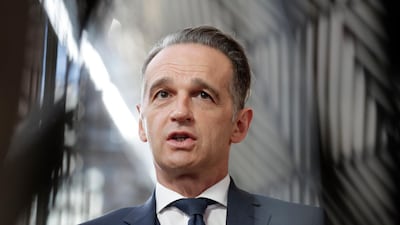The health crisis presented by the coronavirus has confirmed the necessity for strengthening multilateral ties, German Foreign Minister Heiko Maas has said.
Foreign ministers met via video link on Friday at a UN General Assembly side event hosted by the Alliance for Multilateralism.
The General Assembly, an annual summit of world leaders and diplomats, has been held virtually this year for the first time because of Covid-19 restrictions.
“With rising infection numbers in Europe and other parts of the world, we need to stay vigilant. The pandemic is far from over,” Mr Maas said.
“Indeed, Covid-19 has confirmed what the Alliance for Multilateralism is all about. No country alone can win the fight against the pandemic, or against climate change. We need to join forces,” he added.
The Alliance for Multilateralism was established at last year’s General Assembly to preserve the world’s international institutions and foster ties between its member nations.
The 2020 discussion was dominated by the coronavirus. The impact of the pandemic was highlighted as Mr Maas, the event’s co-host, was forced to dial in remotely from quarantine at home. One of the German foreign minister’s personal protection officers has tested positive for the disease.
French Foreign Minister Jean Yves Le Drian , who also co-hosted the event, ran through the agenda for the discussion which included key segments on health, the environment, digital governance and gender equality.
“We'll also continue to support the initiative to make sure that everyone around the world can have access to new common goods to fight coronavirus, best treatments or vaccines,” Mr Le Drian said.
India’s Foreign Minister Subrahmanyam Jaishankar decried the breakdown of the multilateral system in the face of the coronavirus.
“The past six months laid bare the shortcomings of multilateral institutions in the UN. We could not even agree on messaging to fight the virus, let alone coordinated responses,” he said alluding to infighting over the wording of a global ceasefire in response to the coronavirus crisis.
“Clearly, the multilateral machinery is exhausted if not broken. A cry for reform multilateralism becomes stronger than ever before.”
Mr Jaishankar said India was committed to rebuilding stronger in the wake of the pandemic and advocating a “fairer process of global decision making”.
Kenyan Foreign Minister Raychelle Omamo told the event that the need for multilateralism was key in the fight against climate change particularly in Africa and the Global South.
“The Horn of Africa, for instance, has suffered a combination of climate shocks, such as drought, desertification, floods [and] locust invasions, with serious ramifications,” she said.
“It is for this reason that we as Kenya will prioritise climate change, as we take up our seat at the United Nations Security Council in the year 2021-2022,” Ms Omamo added.

